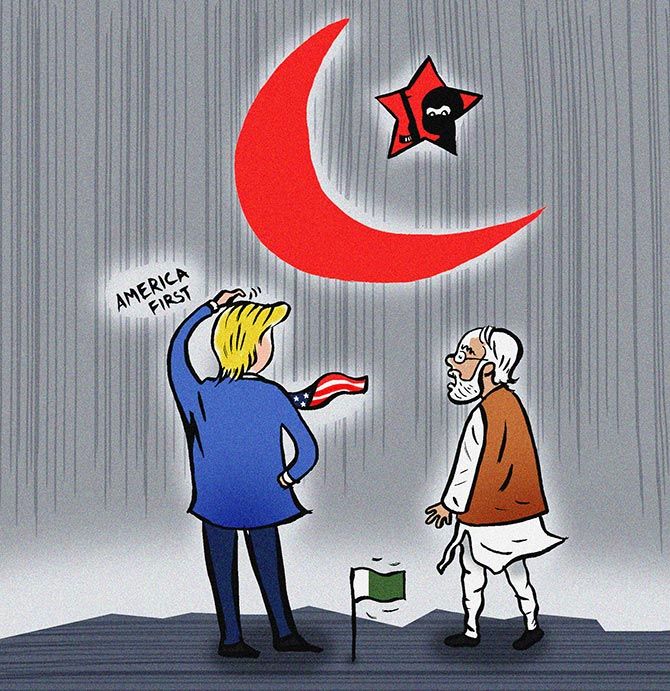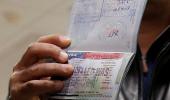'Trump's stated strong stance against Islamist extremism and terrorism could play into the Indo-US relationship.'
'It could mould US attitude and exert pressure on Pakistan.'
'In the event of US military presence in Afghanistan increasing, however, Pakistan could gain an opportunity to again emphasise its importance,' says former senior RA&W officer Jayadev Ranade.
Illustration: Dominic Xavier/Rediff.com

At a time when the international balance of power is still in flux and competition is underway in the Indo-Pacific, Donald Trump's election as the 45th President of the United States has added to uncertainties.
Trump's policies towards the Indo-Pacific -- and especially Japan, India and China -- have the potential to reshape developments in the region.
Discernible from Trump's campaign speeches and other remarks is that economic considerations will underpin most decisions and agreements.
Relationships will tend to be transactional in Trump's administration with a marked preference for bilateral negotiations and agreements rather than international or regional arrangements.
Unclear is the extent of influence that the military officers, who occupy a number of key positions in the Trump cabinet, will exercise on issues like China's actions in the South China Sea.
The considerable domestic opposition to Trump, however, makes it unlikely that policy changes contemplated by him can be implemented soon.
Implementation of the executive orders revising immigration laws has actually been temporarily frustrated by the US judiciary and infighting within the new administration.
The arbitrariness of the orders, which adversely impact the US economy, has been questioned.
Travellers to the US contribute well over $1.5 billion each year and the more than 1 million foreign students studying in US educational institutes provided over $32.8 billion in 2015-2016.
There are also persistent reports of infighting within Trump's inner circle of advisers. Leaks from the US intelligence community led to Lieutenant General Mike Flynn (retd) quitting within 24 days of his appointment as NSA.
Reports claim too that Russian intelligence has videos that 'compromise' Trump.
Among the countries in the Indo-Pacific, Japan's Prime Minister Shinzo Abe was the first leader to meet Trump on February 10, 2017. During the meeting, Trump reaffirmed the security commitments to Japan adding that the US is behind Japan '100 per cent'.
Both leaders said they would work together to maintain a strong economic relationship even after the US had withdrawn from the Trans-Pacific Partnership. The same day US Secretary of State Rex Tillerson met Japan's Foreign Minister Fumio Kishida and pledged to enhance the US-Japan alliance.
Separately, US Defence Secretary Lieutenant General James Mattis, an important member of the Trump administration, in February reaffirmed US commitments to South Korea and Japan.
The general said the US would act swiftly to preserve the security of its allies against outside threats, including hostile acts by North Korea and China.
General Mattis reaffirmed US commitment to article 5 of the US-Japan security treaty, which includes the Senkaku islands, and called for an inter-governmental approach with allies to maintain stability in the South China Sea and counter China's expansion.
Within four days of his swearing in, Indian Prime Minister Narendra Modi and Trump had a telephonic conversation where Trump described India as a 'true friend and partner' and invited Modi to visit the US.
Among the issues discussed were trade, defence and terrorism and security in South Asia and Central Asia. Modi and Trump emphasised that the US and India will 'stand shoulder to shoulder in the global fight against terrorism.'
Modi is likely to meet Trump in May in what promises to be a good visit since there are few real differences. Both countries have invested a lot in the relationship over the past 20 years and it is in their mutual interest to preserve and build on it.
Trump's stated strong stance against Islamist extremism and terrorism could play into the Indo-US relationship. It could mould US attitude and exert pressure on Pakistan.
In the event of the US military presence in Afghanistan increasing, however, Pakistan could gain an opportunity to again emphasise its importance.
If the US exits Afghanistan, then China and Pakistan will play a larger role there.
Among the irritants that could surface between the US and India is the issue of H1B visas. Here, India will need to work with the US to find a solution.
China is the largest country in the region and has complicated relationships with the US and its allies.
After a rocky start following Trump's telephone conversation with Taiwan President Tsai Ing-wen and his subsequent tweet, Chinese President Xi Jinping and Trump had a lengthy, 'cordial' conversation -- their first -- on February 10.
In a reference to the earlier tension, China's official news agency Xinhua specifically reported Trump as saying 'he fully understands the high significance of the US government's pursuit of the one-China policy, adding that the US government adheres to the one-China policy.
Xinhua quoted Xi as replying that 'he appreciated Trump's stressing that the US government adheres to the one-China policy, adding that the policy is the political basis of China-US relations.'
Trump's telephone conversation with Taiwan's president, however, still rankles with Beijing, which apprehends that the next few years could potentially be rough.
Among the items on Trump's agenda for China are: Reducing the trade deficit; ensuring China revalues its currency; and preventing China from exercising sovereignty over the South China Sea through which trillions of dollars of international cargo transits.
The appointment of the Harvard educated China scholar Peter Navarro to head the newly-established National Trade Council suggests that China will be at the centre of the Trump administration's focus on economic issues.
A comprehensive policy for dealing with China is separately being formulated.
In the context of Trump's warning to US companies to bring manufacturing jobs back to the US from overseas and especially China, the Chinese industry minister said China would not change its plans for expansion of the Chinese economy.
Trump has also said he will increase the size of US ground forces and that of the US navy to over 350 fighting ships.
While this will appreciably increase jobs and manufacturing in the US, it simultaneously implies that the US navy will over the coming decade enhance its maritime presence especially in the Indian Ocean and South China Sea.
Interesting in this context are Trump's conversations with leaders of friendly South-East Asian countries, including Rodrigo Duterte of the Philippines, and their agreement to meet in the near future.
Beijing apprehends that the Trump administration's policies could retard its ambitions and its efforts since 2013 to alter the status quo in its neighbourhood.
China's responses have been measured and deliberate and it has given indication of willingness to cooperate by stopping coal imports from North Korea from February 19, till the end of December 2017 in a bid to apply pressure on Pyongyang.
It has, however, made clear that it will not yield its claims to sovereignty over the South China Sea.
Finally, it remains unclear whether Trump's repeated references to 'America First' are centered only on the economy or also intended to convey that the US will strive to remain the unchallenged superpower.
What is clear is that the Indo-Pacific will be of great interest to the Trump administration.
Jayadeva Ranade, former additional secretary in the Cabinet Secretariat, Government of India, is President of the Centre for China Analysis and Strategy.
MUST READ columns in the RELATED LINKS below.










